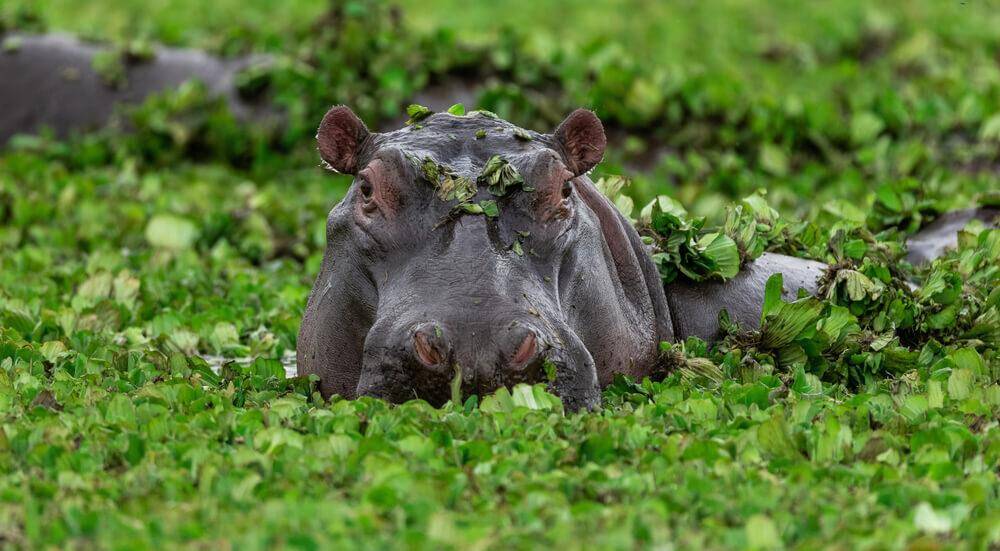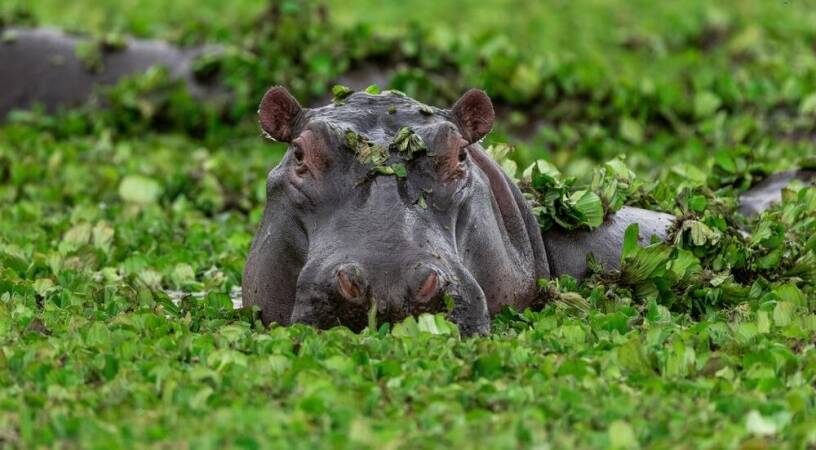

The hippopotamus, often referred to as the “river giant,” is the second-largest land animal after the elephant and rivals the white rhino in both weight and size. For those pursuing dangerous game hunting in Africa, the hippo remains a key species within the Dangerous 7—a group that includes lions, leopards, elephants, rhinos, Cape buffalo, and crocodiles.
Despite its seemingly calm appearance, the hippo is one of the most formidable animals a hunter can face. Their territorial behaviour, unpredictable aggression, and sheer strength make hippo hunts both thrilling and rewarding.
Hippos inhabit sub-Saharan Africa, thriving in environments that provide ample access to water. Their preferred habitats include:
Top destinations for hippo hunting safaris include:
However, their range has gradually declined due to habitat loss, making regulated, ethical hunting an essential part of conservation.
The hippopotamus (Hippopotamus amphibius) is a semi-aquatic mammal, spending up to 16 hours a day submerged in water. This behavior helps them regulate body temperature and protect their sensitive skin from the harsh African sun.
These habits influence hunting strategies, as understanding hippo movements and behavior is critical for success in hippo hunts.
Hippos are deceptively dangerous. While they appear slow and docile, they are highly aggressive and territorial, particularly in water.
Statistics show that hippos are responsible for over 500 human fatalities annually, often through capsizing boats or charging intruders.
For hunters, these traits make hippo hunting an intense and rewarding challenge.
A successful hippo hunt is about more than the trophy—it’s a test of patience, skill, and courage. Hippo tusks are a prized addition to any trophy collection, symbolizing a hunter’s ability to take on one of Africa’s most dangerous animals.
Additionally, ethical hunting plays a role in conservation:
Our African hunting safaris offer:
For those seeking the thrill of dangerous game hunting, hippo hunts deliver excitement, danger, and a true sense of achievement. Are you ready to face one of Africa’s most formidable creatures?
Book your hippo hunting safari today and experience the adventure of a lifetime.
Name:
Hippopotamus Amphibius
Male Weight:
3,300-3,970 pounds
Male Shoulder Height:
4.6 feet
Range:
Sub-Saharan Africa
Mating Season:
Breeds all year around but peaks between February and August
Life span:
40-50 years
The Hippo is a Much Prized Trophy that Challenges Hunters to Bring their A-game at All Times.
When preparing for a game hunting safari, it is important to remember that most of the time your target will be in the water, with only the top of their head visible. Hippos have a large barrel-shaped body, with short, stubby legs and tails. Its body color is a mixture of greyish to muddy-brown colors, with a pale pink underbelly. The hippo has a large head, which at times is all you can see when it lies submerged in water and this makes it very difficult to differentiate between a male and female hippo. When game hunting in Africa, and you are at the stage of needing to identify the target’s gender, remember that male hippos are larger and their teeth and tusks are larger than females, which makes identification a bit easier when only the head is visible! Hippos have large tusks in both jaws, representing the upper incisors and the lower canines, with 36 teeth in total. Their sharp tusks can grow up to a foot long and actually never stop growing. They are used by hippos to fight other males and used in defence when attacked. They are strong swimmers and as adults can stay submerged for up to five minutes at a time before having to surface for air. They even can sleep underwater, using a reflex that allows them to bob up, take a breath, and sink back down without waking up.
Any game hunting in Africa comes with its own set of challenges but hippo hunting can be very difficult. The reason is that hippos spend most of their lives in the water, submerged with only their eyes keeping a watchful lookout. This makes it difficult to gather information on the animal and differentiate in terms of male or female or the actual size of the hippo. And then…just when you have it in your sights…it will disappear beneath the water and either sink away for a while or literally walk under the water on the bottom of the river or dam, to a quieter, more peaceful area away from any disturbances.
Hippos remain a popular species for dangerous game hunting in Africa and they are hunted in three main methods. The first way is by quietly sneaking along the water’s edge until you spot a suitable trophy bull and then an accurate shot is needed to harvest it. Keep in mind that the hippo will sink and hunters will be required to wait for the hippo to rise and return to the surface, which may take up to an hour or two. The second method is much the same as the first, but this time the hunter will be in a boat and not on foot. The added adrenaline and danger come with the knowledge that hippos are not only very aggressive and dangerous but also fully capable of capsizing the vessel. The last option for harvesting a hippo is to try to intercept it while it travels from its water-based habitat to dry land for feeding. They leave their resting waters, where they spend close to 80% of their time, near dusk, and return in the morning, which would result in a night hunting opportunity.
A minimum caliber of a .375 is a legal requirement when it comes to hunting hippo in Africa. In this caliber use a minimum of 300 grain bullet. This member of the dangerous seven has exceptionally thick skin and thick skull bone. A solid bullet is required to ensure penetration. Out of water and up close taking a broad side shot, a .416 Rigby or 500NE is suggested to enter the heart for an accurate kill shot. Hunting in Africa is not a walk in the park as they say, but to be able to return home after some game hunting with the trophy of a hippo bull is well worth the blood, sweat, and tears that are needed to hunt one.
Hippo hunts offer an unparalleled experience for hunters seeking the thrill of pursuing one of Africa’s most dangerous animals. Known for their immense size, territorial behavior, and unpredictable nature, hippos are a formidable challenge that demands respect and skill. This page is designed to provide you with valuable insights into hippo hunting, equipping you with the knowledge needed to prepare for a successful and safe hunt.
Hippo hunts are not just about bagging a trophy; they are about the adventure and challenge that come with hunting one of Africa’s most dangerous animals. The hippo, a member of the Dangerous 7, is notorious for its aggressive behavior and is considered one of the most challenging animals to hunt. The thrill of tracking a hippo, combined with the unique environments where they are found, makes hippo hunts a must for any serious hunter.
Africa’s diverse landscapes offer several prime locations for hippo hunts. These include:
Each of these regions provides unique challenges and rewards, ensuring that your hippo hunt is both exciting and fulfilling.
To succeed in hippo hunts, understanding their behavior is crucial. Hippos spend most of their time in water, emerging at night to graze. They are highly territorial, particularly in water, and can become aggressive if they feel threatened. Knowing how to approach a hippo and recognizing the signs of aggression can make the difference between a successful hunt and a dangerous encounter. It’s also important to note that hippos are social animals, often found in groups, which can make singling out a target more challenging.
Practicing ethical hunting is crucial to maintaining the balance of wildlife populations, including hippos, and ensuring hunter safety. It is essential to work with experienced guides who are well-versed in local hunting regulations and understand the behavior of hippos to minimize risks. Following the principles of fair chase and ensuring a humane kill are key aspects of ethical hunting. Hunters are encouraged to participate in conservation efforts through reputable organizations such as the African Wildlife Foundation, which supports the preservation of natural habitats for hippos and other African wildlife.
Hippo hunts are unique due to the combination of danger, skill, and the majestic African landscapes in which they take place. The challenge of hunting an animal that spends most of its time submerged, the need for precise shot placement, and the sheer size and strength of the hippo make these hunts truly extraordinary. Whether you are an experienced hunter or seeking to add a new trophy to your collection, hippo hunts offer an adventure unlike any other.
Prime locations for hippo hunts include Zambia, Tanzania, and Zimbabwe, where large populations of hippos inhabit rivers, lakes, and other water bodies.
Hippo hunts can be conducted year-round, but the dry season often provides better visibility and access to hunting areas.
A minimum caliber of .375 is required, but larger calibers such as .416 Rigby or .458 Lott are preferred for their stopping power.
Hippos are highly territorial, especially in water, and can be extremely aggressive. Their size, strength, and sharp tusks make them one of the most dangerous animals to hunt.
Preparation includes selecting the right gear, understanding hippo behavior, and working with an experienced guide to plan your hunt effectively.
Yes, hippos can be hunted on land, typically during their nocturnal foraging trips. However, this method requires careful planning and timing.
Ethical hippo hunting involves following local regulations, working with experienced guides, and ensuring a humane and responsible hunt.
After a successful shot, the hippo may sink and resurface later. Retrieval usually involves waiting for the hippo to float back to the surface, which can take time.
Hippo hunting is challenging due to the animal’s behavior, its aquatic habitat, and the need for precise shot placement to ensure a clean kill.
Search from our range of Hunts across various popular destinations in Africa.
Find A Hunt